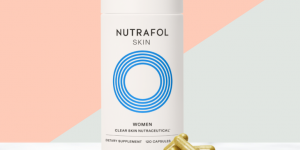Free Shipping Over $100
Free Samples With Every Purchase
Auto Replenishment Available
Authorized Reseller
Discover the Best Nighttime Retinols for Radiant Skin

Retinol is a skincare ingredient that’s derived from vitamin A. It’s extremely beneficial in the treatment of acne, improves the appearance of fine lines and wrinkles, promotes skin cell turnover, and generally makes skin look and feel healthier. If you’re not using retinol as part of your nighttime skincare routine, you really should be! In this blog, you can learn more about what retinols are, the many benefits of using retinols, and how to incorporate retinols into your daily routine.
Benefits of Nighttime Retinols
Retinols are actually a lower percentage skincare product made as an over-the-counter alternative to the stronger retinoids. There are numerous benefits of nighttime retinols, including:
- Accelerated Skin Cell Proliferation – proliferation is the production phase of skin cells. This phase is accelerated retinol use, so new, healthy cells are produced more quickly thanks to retinol treatment.
- Exfoliation – dead skin cells are dissolved away, revealing healthy new skin cells.
- Pore Clearing – regular use of retinol serums keeps pores clear.
- Increased Collagen Production – more collagen is produced more quickly with regular retinol use, improving the youthful, smooth appearance of skin and increasing elasticity.
- Thickened Skin – age causes skin to thin, but retinols increase thickness, preventing damage and improving the appearance of skin.
- Reduced Melanin Production – this is the pigmentation part of the cells that gives skin its tone. Hyperpigmentation due to sun damage and aging can be minimized with retinol use.
- Fights Inflammation – retinol helps with skin inflammation. This is beneficial for acne treatment.
Factors to Consider When Choosing Nighttime Retinols
While retinol offers numerous skin health benefits, there are some factors that need to be considered before incorporating retinols into your daily routine, including:
- Side Effects – dry, itchy, irritated skin can happen. This is called retinization, and it’s important to be on the lookout for these symptoms and adjust your treatment to reduce irritation.
- Sun Sensitivity – retinol causes skin to be more sensitive to sunlight. For this reason, it’s important to apply retinols in the evening and make sure to use sunscreen in the morning to protect skin.
- Don’t Mix Retinols – using more than one retinol product at a time increases risk for skin irritation. When irritation does occur, you won’t know which retinol caused the issue. Use only one retinol product at a time.

Review and Comparison of Popular Products
There are numerous nighttime retinols on the market, and they’re all formulated a little differently. Designed to meet specific needs and improve results, these products are as unique as your skincare needs. You can learn a bit more about some of our dermatologists’ favorites below.
 SkinCeuticals Resveratrol B E
SkinCeuticals Resveratrol B E
- SkinCeuticals Resveratrol B E Key Ingredients: Resveratrol, Baicalin, Vitamin E
- Benefits: Antioxidant protection, skin firming, and hydration
- Usage: At night, apply one to two pumps to face and neck after cleansing the face
MD Skin Essentials Energize
- MD Skin Essentials Energize Key Ingredients: Retinol, Vitamin C, Vitamin E
- Benefits: Brightening, anti-aging, and skin rejuvenation
- Usage: Apply after cleansing nightly or every other night as directed by your dermatologist
 SkinBetter Science AlphaRet and AlphaRet Eye
SkinBetter Science AlphaRet and AlphaRet Eye
- SkinBetter Science AlphaRet Overnight Cream and Interfuse Treatment Cream EYE Key Ingredients: Retinoid, Alpha Hydroxy Acid (AHA)
- Benefits: Gentle exfoliation, reduction of fine lines and wrinkles, improvement in skin texture
- Usage: Apply the AlphaRet Overnight cream to the face at night after cleansing, follow up by dabbing a small amount of the Interfuse Treatment Cream EYE beneath the eyes
Sente Bio Complete Serum
- Sente Bio Complete Serum Key Ingredients: Heparan Sulfate Analog (HSA), Retinol, Vitamin C
- Benefits: Hydration, skin barrier repair, reduction of redness and irritation
- Usage: Apply nightly to a clean face
Tips for Incorporating Retinols
When you’ve chosen the best retinol serum for your skincare needs, it’s important that you incorporate it into your nighttime skincare routine correctly.
Your dermatologist can offer personalized recommendations, but some basic retinol application tips include:
- Use at Night – retinols come in opaque packages because they are sensitive to light. When applied, they can make skin more sensitive to the sun’s UV rays and other forms of light. For this reason, they need to be applied as part of the nighttime skincare routine.
- Buildup – retinols typically come in a range of formulas based on the percentage of retinol. Lower percentages are gentle with higher percentages of retinol increasing in strength. Starting at a low retinol percentage and building up over time allows your skin to adjust to the effects. If you don’t notice any skin irritation, go ahead and bump up to a stronger solution.
- Alternate Application Days – another way to allow skin to acclimate to retinols is applying it only every other day. For some, skin acclimates to retinol use, and they are able to apply nightly. Others can reap the rewards of retinol use without the symptoms by continuing to apply only every other day.
- Less Is More – it’s easy to apply too much retinol. It is usually a light, silky formula that is easily absorbed by skin. Unfortunately, this means too much product can be applied, leading to skin irritation or dryness. A pea-sized dollop of retinol should be adequate to cover your entire face. If you want to cover your neck and décolletage, you may want to use a bit more.
- Keep An Eye on Skin – as you first start using retinol, keep an eye on skin. If you notice dryness or irritation, skip a day or two, reduce the percentage of retinol, or consult with your dermatologist for personalized recommendations.
- Moisturize, Moisturize, Moisturize – you should always apply moisturizer with retinol. For many, applying moisturizer then retinol improves skin response. If you notice skin irritation even after applying moisturizer first, consider mixing a smaller amount of retinol with a thick, cream-based moisturizer to apply. This helps to prevent many of the potential adverse effects.
- Consistency is Key – whether you’re trying to improve skin tone and texture or want to clear up an acne break out, consistently using retinol is the key to success. It takes time and consistent application to achieve your results. Most people won’t see their desired results before three to four months of retinol use.
Keep Skin Smooth, Youthful, & Healthy
Retinols offer numerous benefits. That’s why dermatologists recommend them as part of almost every skincare routine. From acne to anti-aging, retinol is a powerful ingredient that improves the appearance, texture, and health of skin. When incorporated correctly, retinol is safe and effective for almost every skin type. Those with very sensitive skin or those with rosacea, psoriasis, or eczema-prone skin may want to consult with a dermatologist before starting with a retinol.
Explore More Skincare Products Tips
Most patients can benefit from adding a retinol to their evening skincare routine, but this essential skincare product does have some potential complications. It’s important to choose the right retinol and consult with a dermatologist if you notice any adverse effects like red, itchy skin or peeling. If you’re interested in exploring more dermatologist-recommended products to improve skin health and beauty, we hope you’ll come back to read our blogs regularly for more tips and recommendations. You can also explore more of the curated list of skincare essentials on the Derm Skincare site.














